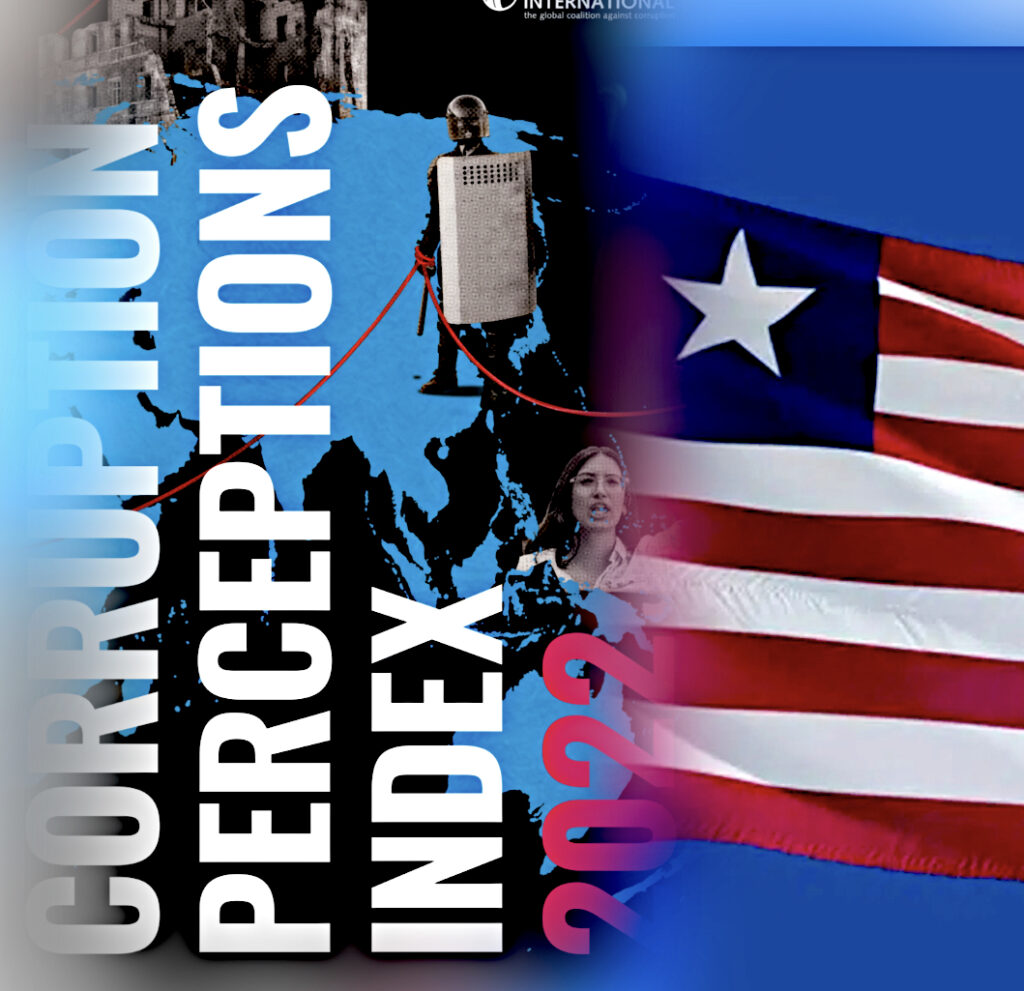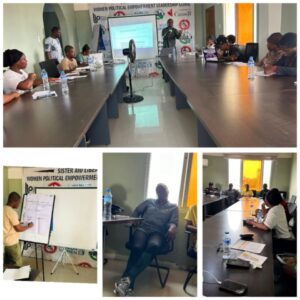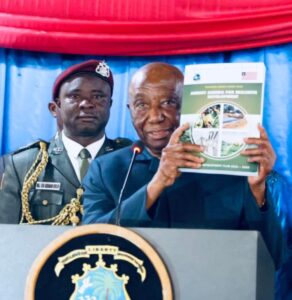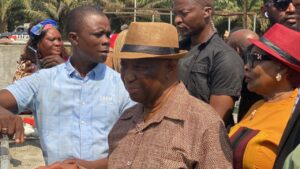LIBERIA RANKS ‘SIGNIFICANT DECLINER’ IN 2022 CORRUPTION PERCEPTION INDEX

By: Lisa Diasay
Liberia: The 2022 Corruption Perception Index (CPI) has rendered Liberia a ‘Significant decliner’ due to unresolved corruption allegations and a persistent culture of impunity. The country is currently at 29 On the 2022 CPI.
The report issued hours of the Liberian President 6th State of the Nation Address (SONA), highlighted that Inadequate resourcing of anti-graft institutions and a weak judiciary continue to undermine the fight against corruption in the West African nation, with Liberia being one of those countries.
The CPI 2022 noted that Liberia dropped 12 points (from 41) since 2012, thus describing it as a significant decliner in the fight against corruption.
This year’s Corruption Perceptions Index (CPI) reveals that 124 countries have stagnant corruption levels, while the number of countries in decline is increasing. This has the most serious consequences, as global peace is deteriorating and corruption is both a key cause and result of this.
Corruption and conflict feed each other and threaten durable peace. On one hand, conflict creates a breeding ground for corruption – political instability, increased pressure on resources and weakened oversight bodies create opportunities for crimes, such as bribery and embezzlement.
Unsurprisingly, most countries at the bottom of the CPI are currently experiencing armed conflict or have recently done so.
On the other hand, even in peaceful societies, corruption and impunity can spill over into violence by fuelling social grievances. And siphoning off resources needed by security agencies leaves states unable to protect the public and uphold the rule of law. Consequently, countries with higher levels of corruption are more likely to also exhibit higher levels of organised crime and increased security threats.
“In this complex environment, fighting corruption, promoting transparency and strengthening institutions are critical to avoid further conflict and sustain peace”, the report noted.
The report is coming at the time when there are series of unanswered questions surrounding the investigation and prosecution of alleged corrupt officials in the Weah-led administration and as well the gruesome murder of anti-graphs employees.
In 2021, the US sanctioned three public officials (classified as close associates of Pres. George Weah) for corruption and misusing public office and resources. Nathaniel McGill (Former Minister of State), Bill Tweahway (Former National Port Authority Managing Director) and Sayman Syrenius Cephas (Former Solicitor General) resigned with no trace of investigation into the Treasury Department discovery. Earlier, the US Treasury also sanctioned two senators Cllr. Varney G. Sherman and Senator Prince Y. Johnson, both are currently serving the 54th National Legislature.
Meanwhile, Pres. George Weah in his 6th and final SONA praised his government’s efforts for ensuring transparency and accountability of anti-graphs institutions including the passage of the Liberia Anti-Corruption Commission Act (giving it prosecutorial powers); strengthening of the General Auditing Commission among others.
Pres. Weah fell short to mention the trajectory of prosecution for corruption officials before the end of his tenure or first term if he would get a second term in October 2023.
“As our fight against corruption and financial crimes remains paramount, we applaud you also for passage of bills seeking to strengthen our integrity institutions, such as the
Amended Central Bank of Liberia Act, the Financial Intelligence Agency Act, the Anti-money Laundering Terrorist Financing, Preventive Measures, And Proceeds of Crime Act, 2021, the new Internal Audit Agency Act, and the Amended and Restated Liberia Anti-Corruption Commission Act. Together, these laws will strengthen our anti-graft institutions and minimize the vices associated with corruption and financial crimes in our country. They will also further strengthen our financial sector and make it consistent with international best practices, and will also ensure secure financial transactions in support of our monetary and fiscal policies”, Pres Weah Stated in the SONA on Monday January 30, 2023 at the Capitol Building.
As revealed in the Naymote 5yrs President Meter report (2018-2022), stronger institutions, independence and robust support for anti graph institutions are needed for the strengthening of the country’s democracy.
The 2022 CPI suggested that there is a need to reinforce checks and balances, and promote separation of powers. “Anti-corruption agencies and oversight institutions must have sufficient resources and independence to perform their duties. Governments should strengthen institutional controls to manage corruption risks in defence and security, as identified in the Government Defence Integrity Index (GDI). Share information and uphold the right to access it. Ensure the public receives accessible, timely and meaningful information, including on public spending and resource distribution. There must be rigorous and clear guidelines for withholding sensitive information, including in the defence sector.”
The report furthered “Limit private influence by regulating lobbying and promoting open access to decision-making. Policies and resources should be determined by fair and public processes. Measures such as establishing mandatory public registers of lobbyists, enabling public scrutiny of lobbying interactions and enforcing strong conflict of interest regulations are essential and Combat transnational forms of corruption”, the CPI 2022 noted.
Similarly, the 2022 CPI named countries with strong institutions and well-functioning democracies which often find themselves at the top of the Index. They include Denmark heads the ranking, with a score of 90, Finland and New Zealand follow closely with a score of 87. Norway (84), Singapore (83), Sweden (83), Switzerland (82), the Netherlands (80), Germany (79), Ireland (77) and Luxembourg (77) complete the top 10 this year.
The report furthered that diverting public resources away from the common good to benefit special interest groups can cause popular discontent. Also Corruption, exclusion and outright discrimination increase the risk of outbreaks of violence and make them harder to control once they erupt.
However, the Chair of Transparency International Delia Ferreira Rubio has called on governments to do the hard work by rooting out corruption at all levels to ensure government work for all people. “Corruption has made our world a more dangerous place. As governments have collectively failed to make progress against it, they fuel the current rise in violence and conflict – and endanger people everywhere. The only way out is for states to do the hard work, rooting out corruption at all levels to ensure governments work for all people, not just an elite few”, Delia Ferreira Rubio Chair, Transparency International.



